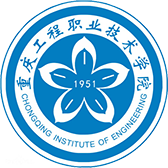School Badge

About Chongqing Vocational Institute of Engineering
Development HistoryChongqing Vocational Institute of Engineering is a full-time general higher vocational institute organized by Chongqing Municipal People’s Government and supervised by Chongqing Municipal Education Commission. The institute was founded in 1951, held higher vocational education in 1998, upgraded to a higher vocational institution in 2001, built into one of the 100 national model higher vocational institutions in 2010 and a national quality higher vocational institution in 2019. In the same year, it was selected as a construction unit of the high-level higher vocational institute and professional construction plan with Chinese characteristics, and in 2021, it was selected as a construction unit of the high-level higher vocational institute and professional cluster in Chongqing.
In the past 70 years, the institute has been adhering to the “Wugin Spirit”, which is based on patriotic dedication, insisting on the fundamental task of establishing moral education, running vocational education in the southwest of China, closely relying on the industrial development of the twin-city economic circle in the Chengdu-Chongqing area, continuously exploring the development path of vocational education to adapt to society, and constantly innovating the concept of education and teaching, the system and mechanism of institute running and the talent training mode. The institute has made continuous progress in its career.
Features of instituteing
The College has established the orientation of “vocational undergraduate, engineering technology, education and training, radiating southwest China, and industry benchmark”, and cultivates high-level technical and skilled talents with the qualities of “sharpening hardship, faithfulness, precision and perseverance”. The university has formed a professional construction orientation of “double main body, double characteristics and coordinated development”, with equipment manufacturing and electronic information as the main body, mapping and geographic information and security as the characteristics, and civil engineering and construction, finance and trade, and culture and art as the coordinated development, focusing on building “sharpening hardships and sharpening actions, revering virtues and skills, being open and pioneering, and being wise and intelligent”. The institute is characterized by “hard work, virtue and skill”, “openness and pioneering” and “wisdom and intelligence”.
Basic Conditions
Address: The institute is located in Jiangjin District of Chongqing, the hometown of Marshal Nie Rongzhen, the science city of western China (Chongqing), with convenient transportation, close to Jiangjin North Station of YUKUN High-speed Railway and Binjiang New City Station of Chongqing Municipal Railway Line 5.
institute scale: There are more than 17,000 full-time students, 80 international students and 3,000 adult students.
Infrastructure: The campus covers an area of nearly 1,300 mu, with a building area of over 430,000 square metres. The average floor space for students is nearly 50 square metres; the average teaching and administrative space for students is nearly 20 square metres.
Library materials: The university library has a collection of over 1.1 million paper books, 1.4 million electronic books, nearly 30,000 electronic journals, and a resource-rich cloud platform of shared professional teaching resources.
Academic Departments: There are 11 secondary academic departments, including the institute of Intelligent Manufacturing and Transportation, the institute of Big Data and Internet of Things, the institute of Civil Engineering, the institute of Finance and Tourism, the institute of Resources and Security, the institute of Surveying, Mapping and Geographic Information, the institute of Art and Design Engineering, the institute of Marxism, the institute of Liberal Studies, the Department of Physical Education and National Defence, and the institute of Continuing Education.
Major Settings: The institute offers 57 specialist (higher vocational) majors. The majors are fully in line with the innovation-driven development strategy of Chongqing led by big data intelligence, and follow the development direction of Chongqing’s smart town and smart city, forming 14 national key/backbone majors led by the national double-high specialty group of mechatronics technology, driving the development of municipal A-class high-level specialty groups such as modern mobile communication technology and engineering measurement technology iteratively.
Faculty: The institute has more than 1,000 teaching staff, with 64.41% of full-time teachers with graduate degrees and 38.91% of full-time teachers with senior titles. Among them, there are more than 80 professors (including professor-level senior engineers) (one doctoral supervisor and more than 10 master’s supervisors), nearly 200 associate professors (including senior engineers and senior accountants), more than 50 doctors, and nearly 500 “double-teacher and double-competent” teachers.
Teaching resources: 1 national-level professional teaching resource library, 4 municipal-level professional teaching resource libraries; 1 national-level high-quality online open course, 22 municipal-level high-quality online open courses, 10 municipal-level first-class courses; 1 national-level and 3 municipal-level model courses on thinking and politics; 2 national-level teaching achievement awards.
Industry-education integration: VET is outstanding in its adaptability, serving the intelligent and digital development of Chongqing industry, leading the formation of one national model VET group and two municipal VET groups, and being one of the universities in Chongqing that deepen the integration of industry-education as a whole. The university is a national construction industry shortage talent training base, a national “dual-teacher” teacher training base, a national mining talent training base, a Chongqing IT software talent training base and a Chongqing high-skilled talent training base.
Scientific research and training: In the past 2 years, more than 80 scientific research projects at provincial and ministerial level or above have been set up. In the past 2 years, the average annual amount of scientific research and technical service projects exceeded RMB 30 million. 2021, the training reached nearly 35,000 people.
Advantages of Running institute
The quality of talents continues to rise. Since its establishment, the university has trained more than 110,000 professionals for the country, and more than half of the alumni of coal enterprises in the southwest region are management cadres above the middle level, making the university known as the “Whampoa of the coal industry” in the southwest. In 2019, students won 5 first prizes in the National Competition, ranking eighth in China; in 2020, students won the third highest medal in China; and in 2021, students won 4 first prizes in the National Competition, ranking first in China. In the 7th China International “Internet+” Student Innovation and Entrepreneurship Competition, the institute won 2 silver medals and 5 bronze medals, ranking first in the country in terms of the number of awards won by higher education institutions. In the past three years, the graduation placement rate was 97.8%. Employer satisfaction rate remains above 99%.
Expert competent teachers lead the teaching. There are 2 national-level teaching innovation teams for vocational education teachers, 1 national-level teaching team, 1 Ministry of Education curriculum thinking and government teaching master team, 1 Huang Danian-type teacher team in Chongqing colleges and universities, and 4 Chongqing-level skill master workshops. There is one special government allowance expert, two national technical experts, one national excellent teacher and one national advanced worker in science popularization. There are 2 Chongqing “May Day Labour Medal”, 4 Chongqing Famous Teachers (including Chongqing Talent Famous Teachers), 2 Bayu Scholars, 1 Chongqing Advanced Worker, 3 Chongqing Model Teachers, and 1 Chongqing Young and Middle-aged Expert with Outstanding Contribution. At the same time, Professor Liu Renhuai, an academician of the Chinese Academy of Engineering, has been appointed as the honorary headmaster of the institute, and a team of part-time teachers consisting of technical experts and skilled craftsmen from industrial enterprises has been formed.
The characteristics of diversified instituteing are obvious. The institute has built a four-party platform of “government, industry, enterprise and institute” and collaborated with enterprises and institutions such as the China Coal Education Association to form a broad base of multi-party cooperation. We have fully gathered the resources of the VET Group to form a closely linked VET community, and jointly built three mixed ownership secondary colleges with enterprises such as ZTE, New Mainland and Huawei, including ZTE Communication College, New Mainland Internet of Things Industry College and Huawei Artificial Intelligence Industry College; built order classes for Huawei, Southern Surveying and Mapping and Ali Innovation, and explored the development of professional standards, teacher team building and technical skills personnel training between institutes and enterprises. We have explored the mechanism of mixed ownership and diversified institute running with deep integration and obvious characteristics.







